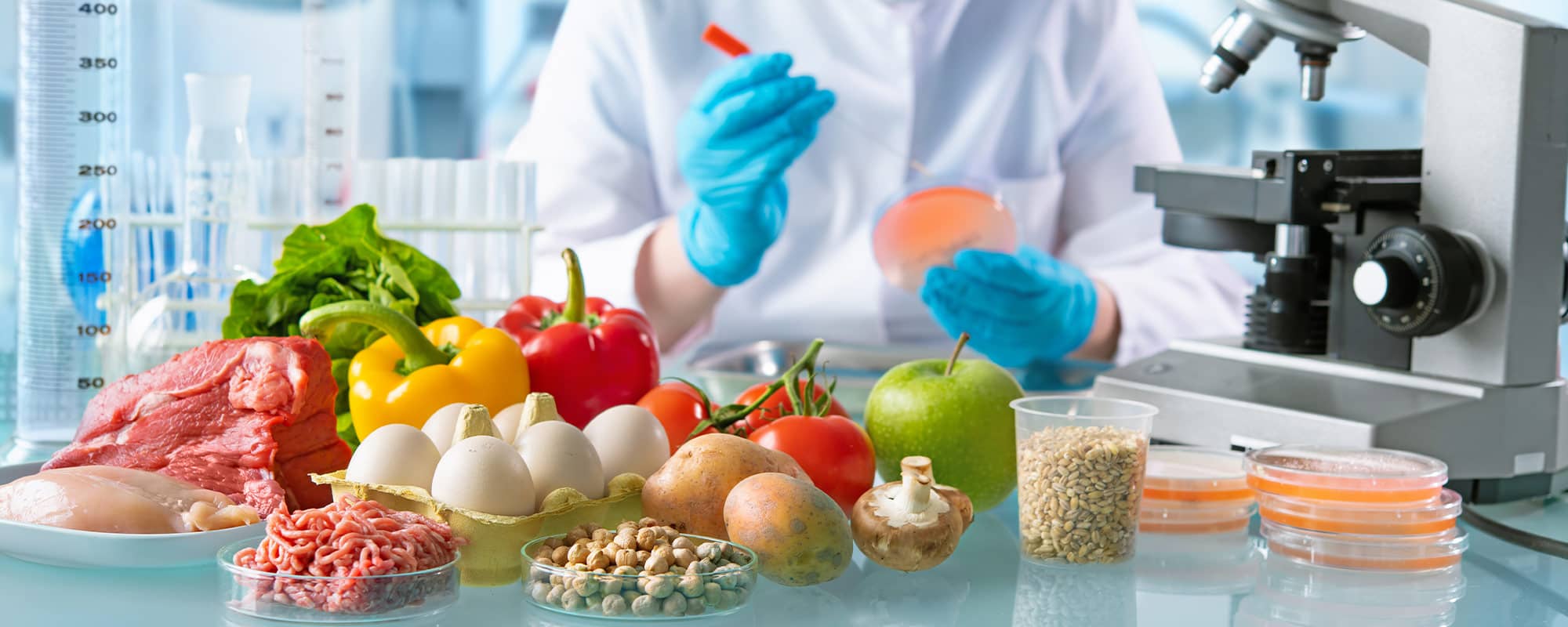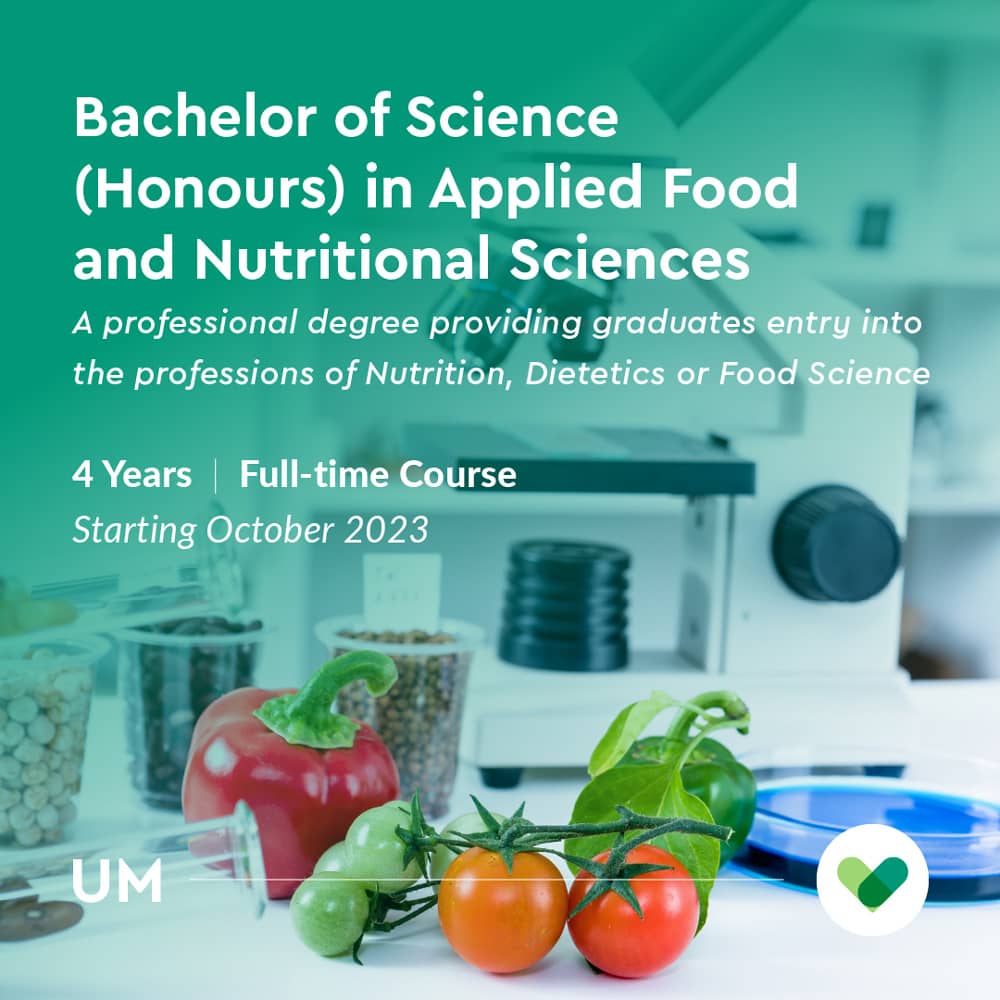Do you consider yourself a foodie with a passion for promoting a healthy lifestyle? Are you interested in the science of food, and do you want to help our planet become more sustainable? Can you see yourself working as an allied health professional with your own private practice? Look no further than this upcoming course from the Department of Food Sciences and Nutrition that will equip you to pursue abundant career opportunities in the field of Food and Nutritional Sciences.
This October, the Faculty of Health Sciences will welcome the academic year with an exciting course for students with a passion for food, health, and science. Graduates entering this programme are passionate about the study of food and its influences on our health and leave university as professionals in the food and health industry. Organised by the Department of Food Sciences and Nutrition, this four year Bachelors of Science (Honours) in Applied Food and Nutritional Sciences programme will launch graduates directly into the field of Food and Nutritional Science, where health-oriented professionals discover innovative ways to tackle the various food and wellness challenges our world faces.
Bachelors of Science (Honours) in Applied Food and Nutritional Sciences Programme
The first three years of the course expose students to the fundamentals of the food and nutritional sciences, the ins and outs of the food industry, and the skills needed to succeed. In the fourth and final year, students choose one of three streams and specialise in food science, nutrition, or dietetics.
Students choosing food science are immersed in the professional field through practical learning within the local food industry. With these first-hand connections, graduates of the programme are virtually guaranteed a place in a growing global job market hungry for new professionals. Students branching into nutrition or dietetics will not only receive their degree, but also can immediately register with the Council for the Professions Complementary to Medicine, the first time a local undergraduate programme will lead directly to a registration for these professions.
With practical experience, theoretical learning in various health disciplines, and a secure transition from the classroom to the professional world, this course presents a plethora of opportunities for learners interested in Food Science, Nutrition, and Dietetics. Each of these career paths form a vital part of the health profession, linking together science, nutrition, diet, and health to help people and society foster their physical wellbeing.
Understanding food and how it impacts our bodies benefits the overall health of society and our planet, as consumers can make more conscious decisions about how food impacts wellbeing. But what do careers in Food and Nutritional Science entail, and what are the professional opportunities for students following this course?
What Does a Food Scientist Do?
A food scientist develops every food product we see on supermarket shelves; they test food quality and ensure that products are up to standard for human consumption. Food scientists work in various roles within the food industry, from manufacturing to product development to research and academia. Their work is instrumental in combating food challenges that our world faces, like waste, growing populations, and climate change. Food scientists improve the nutritional content of food, extend its shelf life, make it more sustainable, and adapt it to meet the needs and tastes of today’s consumers. They are the minds behind fortified cereals, shelf-stable milk, and plant-based meat substitutes. They make our world a healthier place, and there is a great demand for motivated minds, particularly students who bring creative ideas to the industry. Food scientists work in research institutions, food manufacturing companies, quality control, and government agencies, providing a niche where graduates of this programme can grow as professionals in the food industry. So, if you are interested in the science behind food, this is the career for you.
What Does a Nutritionist Do?
While a food scientist deals with the technical aspects of food, a nutritionist focuses on the impact of food on human health and the relationship between food and wellbeing. Nutritionists use their knowledge of food science to educate others on the interaction of nutrients and other substances in food, how it influences our health and how diseases can be caused, prevented or managed through diet. They play an essential role in healthcare, community advocacy and policy development, working in settings such as research institutions, government organisations, clinics, and the food industry. As a nutritionist, you could provide the basis for public health recommendations, develop dietary guidelines for a population, create food plans that address specific dietary needs such as weight management or optimising athletic performance, or even support the food industry in new product development by designing food labels
What Does a Dietitian Do?
Dietetics is the practical application of nutritional knowledge. Improving the nutritional status of individuals and groups within a healthcare environment remains the main work field for dietitians. Registered dietitians use evidence-based knowledge from both food science and nutrition to autonomously counsel and empower individuals to provide or select food which is nutritionally adequate. They assess specific nutritional requirements throughout the lifespan and translate this into advice and/or treatment. This will maintain, reduce risk to, or even restore health, as well as alleviate discomfort in palliative care.
The intricate bond between food science, nutrition, and dietetics is continuously evolving, shaped by scientific advancements, societal needs, and global health trends. Technological advancements and increased scientific understanding have opened new horizons, where personalised nutrition and sustainable dietetics are becoming a reality. Functional foods such as probiotic yoghurts for gut health and omega-3 fortified eggs for heart health are on the rise. Food science is pushing the boundaries of what is possible, with lab-grown meat and edible insects marketed as alternative protein sources, paving the way for a more sustainable and health-conscious future.
Graduates from the BSc (Hons.) in Applied Food and Nutritional Sciences programme are on the fast track to the professional field, and subsequent registration after completion of the course practically guarantees a spot in a competitive and international job market. So, if you are passionate about the science of food and dietary health and want to make an impact on an individual, national, and global level, this is the course for you. Graduates of this Bachelor’s programme will thrive in the profession of their choice and will enter a blooming field that is waiting anxiously for fresh and innovative minds to contribute to our global health and well-being.






Comments are closed for this article!